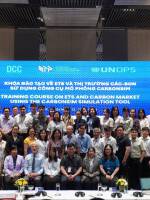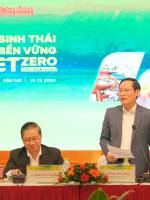
Mitsubishi Power is currently operating the 5,300MW GTCC project in Thailand and supplying M701F gas turbines in Sarawak, Malaysia, and hydrogen-ready power plants for Keppel, Sembcorp, and Meranti Power in Singapore, which are expected to be put into commercial operation in the next two years. How would you assess the conditions in Vietnam for implementing such projects?
Vietnam’s economic growth is very stable, and electricity demand is continually growing. The country is also enhancing its development of renewable resources, including wind power, solar power, and possibly hydropower. However, I think that, in Vietnam, utilizing LNG (liquefied natural gas) is quite important to balance security, affordability, and sustainability.
We provide technology, including gas turbine combined cycle (GTCC) power plants, to enhance the portfolio of generation sources in Vietnam, and we would like to continue contributing to the energy transition journey.
Mitsubishi Power’s GTCC solution can provide the highest level of efficiency, reaching 64 per cent. Compared to conventional coal-fired facilities, the difference in efficiency automatically reduces CO2 emissions by 65 per cent. This will contribute to the energy transition. Gas turbines also have the capability to start very quickly, so a gas turbine combined cycle can serve as a base load, operating continuously in a stable manner. Renewables like solar power, however, will fluctuate depending on the time of day or the weather conditions. We can combine and integrate these with renewable energy sources.
When providing products and systems, we would like to maintain a close dialogue with the Vietnamese Government and also with generation companies, including Electricity of Vietnam (EVN), to determine the most optimum arrangement for Vietnam.
Nations Conference of the Parties (COP), Vietnam affirmed its commitment to achieving net-zero emissions by 2050. What commitments has the Mitsubishi Heavy Industries Group made to contribute to countries like Vietnam achieving their net-zero target?
The Mitsubishi Heavy Industries Group has also set a commitment and target to reach net-zero by 2040. This means we will finish validating technologies for energy transition and decarbonization by 2030, then commercialize such solutions by 2040. From 2040, we will provide these commercialized solutions globally. This also contributes to many countries that have already committed to net-zero by 2050, such as Vietnam. This is why we aim to complete the commercialization of our solutions by 2040.
We have set up several technological roadmaps. In addition to GTCC, which automatically reduces CO2 by 65 per cent, as I mentioned, the latest gas turbines have the capability of firing 30 per cent hydrogen even today. We can gradually increase the hydrogen percentage to 50 per cent and then 100 per cent.
We will finish this technological validation by 2030. The advantage of this approach is that we can start the power station with natural gas or LNG, and gradually increase the clean fuel ratio, thereby reducing CO2 emissions. This is the most realistic and economically-viable approach for energy transition.
Additionally, we also have technology to co-fire ammonia or biomass in existing coal facilities. Even though coal is recognized as the biggest emitter of CO2 in the power generation industry, many countries in the Asia-Pacific region still rely on existing facilities to meet electricity demand. However, if we can co-fire greener fuels like ammonia or biomass, we can reduce carbon intensity, even if just a little. This will also be an important and realistic solution for achieving energy transition and net-zero goals.
Furthermore, we have already commercialized carbon capture systems. In fact, we delivered the world’s largest commercial CO2 carbon capture system in the US – the Petra Nova Carbon Capture Project – which operates on a commercial basis, utilizing decarbonization technologies. We now aim to support countries in this region accelerate their achievement of necessary goals.
One more important point to quicken the energy transition is international collaboration. No single country can achieve decarbonization or net-zero alone. We understand that Vietnam and Japan have very close communications about this activity through the Asia Zero Emission Community (AZEC) framework.
We are in communication with the Vietnamese Government and the private sector, and would like to deepen our collaboration and discussions with both local and Japanese companies.
What are the advantages for Vietnam in implementing renewable energy projects as well as energy transition, especially compared to other countries in the region?
We appreciate Vietnam’s advantages compared to other countries in the Asia-Pacific region in developing renewable energy. The first is stable economic development. At the same time, Vietnam also has a good position to build an ideal portfolio for renewable energy, such as solar power, and its long coastline is also an advantage for developing wind power. To ensure the stability and safety of the system, it is necessary to combine gas power with renewable energy sources.
Vietnam’s National Power Development Plan VIII (PDP8) outlines a roadmap that clearly prioritizes the development of gas-fired power, while also moving towards renewable energy. We hope to be able to support Vietnam’s energy transition using gas turbines.
What do you think are the main challenges Vietnam faces in attracting investment in renewable energy projects?
We do not see a lot of challenges, but we need to move forward with action together with our stakeholders in Vietnam. With the growing demand for electricity, we, of course, have to provide more power generation systems to Vietnam. To increase power generation capacity, the enhancement of grid connections around the country will also be necessary, so it must be a step-by-step approach.
In fact, we cannot build 20-30 gas-fired power plants simultaneously in a short period of time. Therefore, we will have to build power sources gradually, in parallel with the development of renewable energy sources, to ensure synchronization with the development of the grid. At the same time, I think that the development of gas-fired power plants is important in supporting and developing renewable energy and ensuring the supply of baseload power.
The important point is that if we focus too much on developing renewable energy, for example, solar power, which has fluctuating characteristics depending on the time of day, it will affect the safety of the power supply system. Therefore, I believe that the integration of gas-fired power plants to support renewable energy plays an important role in balancing both renewables and baseload capacity to meet energy security and sustainability.
Do you have any suggestions or recommendations for Vietnam to support companies like Mitsubishi Power and enhance the energy transition in Vietnam?
I would like to give an example of a project that Mitsubishi Power is conducting in the US. We are developing a clean energy storage center, which includes the entire process of producing green hydrogen, storing it, and using it in a power plant. This project, ACES Delta, is located in the east of the US, where there are many renewable energy sources. So they are using cheap renewable energy to produce green hydrogen, then storing and using it to generate electricity.
In that area, they have large natural salt mines, which we have been used to create hydrogen storage tanks. After production, we will store the hydrogen in those salt mines. We are also building a hybrid gas-to-power plant to test burning the stored hydrogen. This plant is expected to be operational next year. Under the plan, when put into operation, it will burn 30 per cent hydrogen.
It can be seen that the cost of producing renewable energy here is cheap – the mine stores hydrogen, and it connects to the existing grid to send electricity to Los Angeles, where it is consumed and paid for as clean energy. With such favorable conditions, the project can only be realized with the support of the government, including a guaranteed loan of up to $500 million.
In the early stages of the energy transition, government support is important. In addition, international cooperation, such as the AZEC community, also plays an important role in promoting this process.
We will use lessons learned from building projects in countries around the world to help Vietnam develop technology, and we will also exchange and cooperate with Vietnamese agencies and the government.
Ngoc Lan




